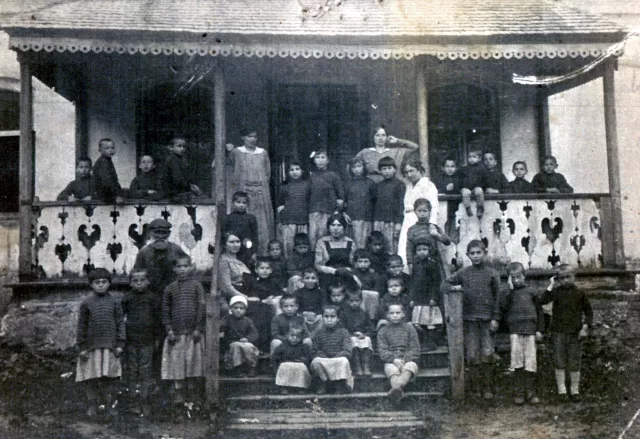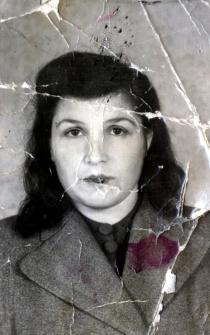This is a picture of me and my sister Hana photographed in the children's home in Tomashpol. The photo was taken around 1924. Hana is on the stairs, on the right, and I am the one standing before her wearing a dark sweater.
My parents were poor. My father Aron Gehtmann was a joiner and my mother Sura Gehtmann [nee Wainshtein] was a housewife. My father was different from other Jews. He liked parties and drinking, and he loved women. In 1920 my mother had another boy, Ehill, named after my grandfather, who had died shortly before. She wasn't attractive any longer and my father lost interest in her. He began to see a Russian woman called Evdokia. There were no arguments in our house. My father just left my mother with the three children. My mother fell ill after my father left. She refused to eat or breastfeed the baby. It was a period of famine [in Ukraine]and it was hard to get milk. The baby was given cow milk with some water, contracted enteric fever and died. My mother died shortly after the baby's death.
My sister Hana and I lived with my grandparents for some time. We starved. I even remember my grandfather saying that we were a burden to them. My cousin Olte and Dvoira often came to see us. They brought us some food, but it wasn't enough. We were getting swollen from hunger. Uncle Abram, my mother's younger brother, came from Kiev and made arrangements for us to get into a children's home.
It was a Jewish children's home in Tomashpol. At least we got regular meals there. In those years the Joint provided assistance and support to Russian children's institutions. We sometimes ate American tinned meat and egg powder - it was a feast. We wore trousers, sweaters and dresses from America. It was a small children's home: a one-storied building with about 40 children and a few teachers. We didn't learn anything. We played a lot and spoke Yiddish. I don't remember any celebration of religious holidays there; I don't remember any holidays from my childhood. It seems to me now that there were none.
I felt lonely in the children's home since my sister Hana, who was three years older than I, was in another class and spent little time with me. We had been staying in that home for about a year, when Evdokia, my father's new wife, came to see us. She brought sweets and tried to persuade us to come live with her, our father and their little son, born in 1922. This happened in summer when Uncle Abram was on vacation in Tomashpol. When he heard about her arrival he quickly came to the children's home and told us that we weren't going to father's new family, where we would just be baby-sitters for their children. Abram told Evdokia to go away. She left and I never saw her again. I didn't know my father until 1945.
Dora Postrelko with her sister
The Centropa Collection at USHMM
The Centropa archive has been acquired by the United States Holocaust Memorial Museum in Washington, DC.
USHMM will soon offer a Special Collections page for Centropa.
Academics please note: USHMM can provide you with original language word-for-word transcripts and high resolution photographs. All publications should be credited: "From the Centropa Collection at the United States Memorial Museum in Washington, DC". Please contact collection [at] centropa.org.










